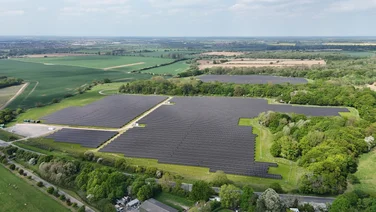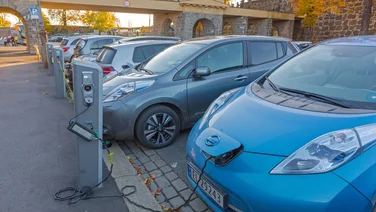We receive a small fee from trusted installers when you request a quote through our site. This helps us keep our content independent, well-researched and up to date – Learn more
- If a driver were to switch from those same petrol cars to an equivalent EV, their savings could jump to more than £1,050 a year
- The Mandate has weakened the incentive for manufacturers to bring down EV prices
- More than 100,000 public EV charge points are now available to drivers in the UK
Britons could be missing out on more than £800 a year if they choose to purchase a hybrid car over a fully-electric car, amid industry concerns around the government’s latest update to the Zero Emission Vehicle Mandate (ZEV).
Earlier this month, the ZEV Mandate update allows for sales of petrol and diesel cars until 2030.
New analysis from the Energy and Climate Intelligence Unit (ECIU) has found that as a result, hybrid electric vehicle (EV) owners could save just £13 a year over their petrol equivalents. However, Walker added that if a driver were to switch to a full EV, these savings could jump to £850.
The ZEV Mandate, according to Colin Walker, head of transport, has weakened the incentive for manufacturers to bring down EV prices, a move that could potentially leave millions of families spending more than £1,000 a year more on driving.
“These changes could encourage manufacturers to switch their focus from selling EVs to selling more hybrids, which are more expensive and polluting to run,” Walker said.
Walker added that these changes “could slow the UK’s EV transition”, resulting in fewer families benefiting from the “hundreds of pounds of savings that can come from running an electric car – savings that are likely to grow even further by 2030.”
The same analysis found that the UK’s bestselling plug-in hybrids offer their owners of just £117 a year over their petrol equivalents. Walker added that if a driver were to switch from those same petrol cars to an equivalent EV, their savings could jump to more than a thousand pounds a year.
“While pitched as a response to the economic chaos of Trump’s tariffs, these changes could actually make things worse, costing UK consumers,” Walker said.
“With less onus on manufacturers to compete to sell EVs in the UK, and the encouragement to sell more hybrids instead, potentially millions could be left footing a bill of up to £1,050 a year for more expensive driving,” Wilson said.
“We’ve seen what this kind of policy flip flopping has done before under the previous government when changes criticised by the then opposition confused consumers leading to lower sales even though EVs remain much cheaper to run”.
The comparatively low savings on offer from plug-in hybrids, in contrast to the claims by their manufacturers, is a result of evidence from the European Commission that found that plug-in hybrids burn 350% more fuel and produce 350% more CO2 than their manufacturers claimed.
But previous analysis found that, despite claims to the contrary, the car industry as a whole successfully complied with its obligations under the ZEV Mandate in its first year.
“Despite global experts identifying the ZEV Mandate as having successfully helped British consumers make the switch to electric driving in record numbers, the Government has chosen to weaken it, ” Walker said.
“Manufacturers are now more likely to prioritise the sale of hybrids, rather than EVs, in the UK, potentially leaving millions of British families unable to make the switch to cheaper and cleaner electric driving.
“EVs are already at price parity with petrol cars on the second hand market and are quickly snapped up when they become available, but these changes will mean fewer second hand EVs available to the 80% of us who buy our cars on the used market.”

How is the industry encouraging takeup?
While there are changes being made, the industry is attempting to supercharge EV adoption, as more than 100,000 public EV charge points are now available to drivers in the UK, according to Octopus Electroverse’s new Charging Infrastructure Insights report.
UK drivers are finding it easier to charge on the road, the report said, with one new public charger installed every 13 minutes in the past six months.
Rapid and ultra-rapid chargers that are powerful enough to recharge EVs in as little as 20 minutes are being rolled out the quickest and now make up 24% of all public charge points.
The landmark figure was announced just days after the updated ZEV Mandate, which also revealed that the government is targeting 300,000 public chargers to be installed in the UK by the same year.
The rollout, according to the report, stands in stark contrast to the declining number of petrol stations, with around 8,300 available across the UK today.
Octopus Electroverse first launched in 2020 and is now Europe’s largest EV charging platform, supporting around half of EV drivers in the UK and more internationally.
Matt Davies, director of Octopus Electroverse, said the milestone shows that there is “real momentum behind electric driving in the UK”.
“Drivers can now trust there is a charger at almost every twist and turn of the road – making plugging in an EV feel as easy as charging up your phone,” he stated.
“We’re well on track to turning the government’s 300,000 target by 2030 into a reality”.

Octopus launches unlimited smart EV charging tariff
Additionally, Octopus Energy has launched Intelligent Drive Pack, a new subscription bolt-on that offers UK drivers unlimited smart charging for £30 a month.
The subscription model is designed for drivers on a standard Octopus electricity tariff, with no smart tariff or home battery required.
All customers need is a working smart meter and one of almost 280 compatible EV brands and chargers installed at home.
The £30 subscription covers smart charging for one EV scheduled by Octopus, usually overnight. Customers can choose a ‘ready by’ time between 4-11am and have the greenest energy possible at a fixed low price.
Rebecca Dibb-Simkin, chief product officer, Octopus Energy said that customers who want to charge during unscheduled hours can use a boost function on their app to charge at their normal home energy rate – not included in the £30 monthly fee.
“With Intelligent Drive Pack, drivers pay 41% of what petrol car owners typically spend each month, which is based on 2023 average mileage of a UK driver of 7,600 miles and the average price for fuel,” she said.
The launch is part of Octopus’ wider mission to make the switch to electric driving a no-brainer, with a fair, flexible solution for all types of drivers.
“Intelligent Drive Pack is a completely new way to save. It’s another step towards making EVs the obvious choice for everyone,” Dibb-Simkin continued.
Octopus’ Intelligent Octopus Go, works with more than 26,000 customers, who now benefit from six hours of cheap, green charging overnight.
Customers who want to sign up to Intelligence Drive Pack can do so here.









